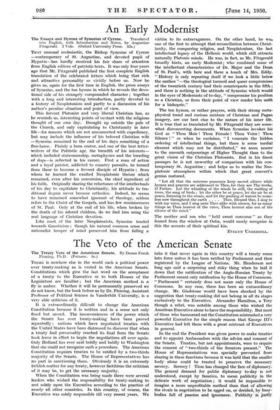An Early Modernist
The Essays and Hymns of Synesius of Cyrene. Translated into English, with Introduction and Notes, by Augustine Fitzgerald. 2 Vols. (Oxford University Press. 42s.) THAT unusual ecclesiastic, the Bishop Synesius of Cyrene —contemporary of St. Augustine, and devoted pupil of Hypatia—has hardly received his fair share of attention from English editors of patristic texts. It was only four years ago that Mr. Fitzgerald published the first complete English translation of the celebrated letters which bring that rich and attractive personality so vividly before us. Now he gives us, again for the first time in English, the prose essays of Synesius, and the ten hymns in which he reveals the devo- tional side of his strangely compounded character ; together with a long and interesting introduction, partly devoted to a history of Neoplatonism and partly to a discussion of his author's peculiar situation and point of view.
This fervent Platonist and very liberal Christian has, as he reminds us, interesting points of contact with the religious thought of our own day. Brought up outside the pale of the Church, and only capitulating to Christianity in later life—for reasons which are not unconnected with expediency, but may include the influence of his beloved Christian wife —Synesius remained to the end of his days something of a free-lance. Plainly a born orator, and one of the best letter- writers of the Patristic age, the breadth of his interests— which included statesmanship, metaphysics and the breeding of dogs—is reflected in his career. First a man of action and a loyal patriot, addicted to country pursuits, he turned from these to become a fervent disciple of Hypatia ; from whom he learned the exalted Neoplatonic theism which remained, even after his conversion, the chief ingredient of his faith. Originally sharing the reluctance of the intellectuals of his day to capitulate to Christianity, his attitude to tra- ditional dogma never became orthodox. Indeed, he seems to have remained somewhat ignorant of theology, seldom refers to the Christ of the Gospels, and has few reminiscences of St. Paul. Only at the end of his life, when broken by the death of his adored children, do we find him using the real language of Christian devotion.
Like most of the later Neoplatonists, Synesius tended towards Gnosticism ; though his natural common sense and rationalist temper of mind preserved him from falling a victim to its extravagances. On the other hand, he way one of the first to attempt that reconciliation between Christ- ianity, the conquering religion, and Neoplatonism, the last intellectual legacy of the Hellenic world, which still attracts naturally Platonic minds. He was, in fact, as Mr. Fitzgerald broadly hints, an early Modernist ; who ' combined some of the intellectual characteristics of Dr. Major and the Dean of St. Paul's, with here and there a touch of Mrs. Eddy. " History is only repeating itself if we look a little below the surface "—the theological turmoil and queer compromises of the twentieth century had their counterparts in the fifth ; and there is nothing in the attitude of Synesius which would in the eyes of Modernists of to-day, " compromise his position as a Christian, or from their point of view render him unfit for a bishopric."
The ten hymns, or rather prayers, with their strong meta- physical trend and curious mixture of Christian and Pagan imagery, are our best clue to the nature of his inner life. It is true that as translated by Mr. Fitzgerald they are some- what disconcerting documents. When Synesius invokes his God as " Thou Male ! Thou Female ! Thou Voice ! Thou Silence ! " or when he exclaims, " I venerate the hidden ordering of intellectual things, but there is some medial element which may not be distributed," we seem nearer to the uncouth outpourings of Higher Thought than to the great vision of the Christian Platonists. But in his finest passages he is not unworthy of comparison with his con- temporary St. Augustine ; and helps us to realize the Neo- platonic atmosphere within which that great convert's genius matured.
" Let all that the universe possesses keep sacred silence while hymns and prayers are addressed to Thee, for they are Thy works, O Father. Let the whistling of the winds be still, the rustling of trees, the song of birds ; let the ether be at peace, let the air be at peace, listening to the strain, and let the gushing of waters be noise- less now throughout the earth . . . . Thee, Blessed One, I sing to with my voice, and I sing unto Thee alike with silence, for as many things as Thou hearest of the voice, Thou hearest also out of the silence of the mind."
The mother and son who " held sweet converse " as they leaned from the window at Ostia, would surely recognize in this the accents of their spiritual kin.
EVELYN UNDERHILL.


































 Previous page
Previous page